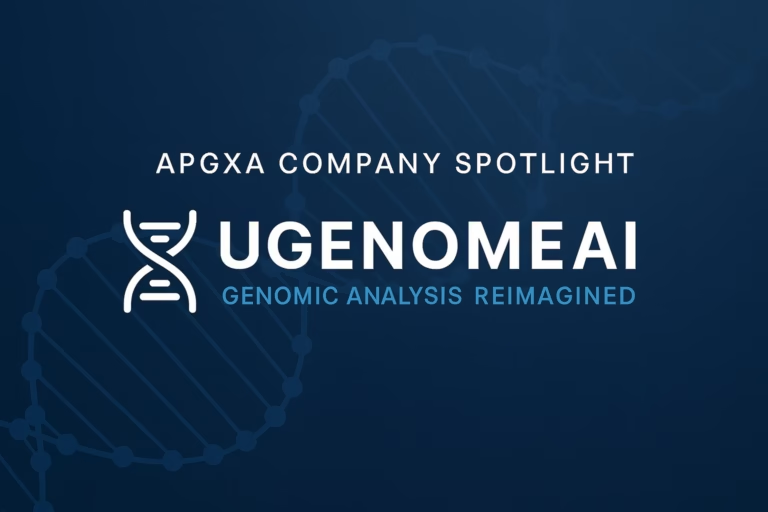“The more information patients have at their hands to make decisions, the better for them.”
That’s the philosophy that drives Dr. Jayden Lee, PharmD—pharmacist, genomics advocate, and co-founder of UGenome AI, a biotech software company at the intersection of genomics and artificial intelligence.
In this conversation with the American Pharmacogenomics Association (APGxA), Dr. Lee shares how his journey from primary care pharmacy practice led to co-founding a company building cutting-edge genomic analysis tools, why he believes whole genome sequencing should be available to everyone, and the policy changes needed to make pharmacogenomics (PGx) more accessible and reimbursable.
| You sequence your genome once, but analyze it many times—for different purposes, over your lifetime. |
APGxA: Can you tell us a bit about yourself and how your career path led to genomics and pharmacogenomics?
Insights from Jayden Lee on Genomics and Patient Care
Dr. Lee: I was born and raised in South Korea, then moved to the U.S. when I was 16. I’ve always been into math and science—chemistry, physics—so pharmacy was a natural fit. After pharmacy school, I completed two years of residency in primary care pharmacy and worked for over 10 years as an ambulatory care pharmacist, mainly managing chronic conditions.
During that time, a few patients brought me their pharmacogenetic test results. I knew pharmacokinetics and pharmacodynamics, but not the genomics side, so I didn’t know how to interpret them. That’s when I became curious about PGx. Meeting Zach, now CEO and my co-founder at UGenome AI, pushed me to really dive into genomics and see how it connected to pharmacy practice.
APGxA: What is UGenome AI, and what do you hope to achieve with it?
Dr. Lee: We’re a biotech software company building secondary and tertiary genomic analysis platforms. Our philosophy is that you should sequence your genome once, but analyze it many times throughout your life for different purposes.
Right now, we have three main tools:
- ProPEx – Generates a pharmacogenetic report from whole genome or exome sequencing data.
- MAXX – Builds a customized reference genome for an individual to improve cancer variant detection.
- Seq4Life – In development, for a wide range of secondary genomic analyses.
All three are research tools, but we also have a personalized medication service in partnership with PlexusDx, a CLIA- and CAP-certified PGx lab. In that service, licensed pharmacists provide consultations based on pharmacogenetic results.
| “We want to make our genomic analysis tools more user-friendly, efficient, and informative—delivering exactly what patients and clinicians are looking for.” – Dr. Lee |
APGxA: You’ve said that ideally everyone would have their genome sequenced. What’s stopping that from happening right now?
Dr. Lee: Cost is a big one—direct-to-consumer whole genome sequencing is about $400, and it’s not covered by insurance. Awareness is another. Many people don’t even know it exists, let alone that it could guide their healthcare. And it’s not integrated into routine medical practice—you can’t just ask your doctor for it.
Also, analysis isn’t a one-time thing. Your genome doesn’t change, but our knowledge about it does. That’s why re-analysis over time is so valuable.
APGxA: What about awareness among pharmacists?
Dr. Lee: I’m mostly self-taught in PGx—reading articles, watching videos. There are good certificate programs, like at the University of Florida, Mayo Clinic, and APHA, but they’re usually for postgraduate pharmacists. In pharmacy school, PGx is often just an elective.
Even among pharmacists, there’s skepticism. I used to think PGx had minimal clinical impact. But the more I learned, the more I saw its potential for lifelong impact on patient care. Awareness and insurance coverage are key to getting more pharmacists engaged.
| “Until you dive in, there’s skepticism. Once you learn what’s possible, you see the lifelong impact PGx can have.” – Dr. Lee |
APGxA: What policy or infrastructure changes are needed to make PGx more accessible and reimbursable?
Dr. Lee: Insurance coverage is essential, private plans often don’t cover it, and Medicare’s reimbursement rate is low. Standardization is another priority. With a lipid panel for example, the results are consistent across labs. With PGx, different labs test different genes and variants, so results vary.
We also need to move beyond limited genotyping toward more comprehensive sequencing. That’s where our ProPax platform can add value—it can analyze whole genome or exome data for pharmacogenetic insights, rather than being restricted to a small panel.
APGxA: Can you tell us more about your new product, Seq4Life?
Dr. Lee: Seq4Life is designed to take any next-generation sequencing data—whether germline or tumor—and generate detailed variant reports. We’re also developing specific panels. It’s still in development, but it will be our most versatile analysis platform.
APGxA: And MAXX—how does that work?
Dr. Lee: MAXX creates a customized reference genome for an individual. Think of sequencing as putting together a puzzle—you need a picture to guide you. Current reference genomes (like HG19 or HG38) are built from a small group of people, so they don’t perfectly match everyone. MAXX builds a personal reference picture, which can improve variant detection, especially in RNA sequencing for tumors.
APGxA: Where do you see UGenome AI in five years?
Dr. Lee: We’re a product-first company. We’ll continue offering services, but our focus is on making our genomic analysis tools more user-friendly, efficient, and informative. Many genomic reports are pages long—we want to give patients and clinicians exactly the information they need, in a format they can use.
APGxA: Parting Shot?
Dr. Lee: Some clinicians worry that too much information is not good for patients. But in my opinion, if patients can get all the information about their genome, the better for them. We’re here to empower our patients to take charge of their health.
Dr. Jayden Lee’s work at UGenome AI is grounded in a clear vision: democratizing access to whole genome sequencing and making the insights both usable and actionable. By combining genomics with AI-powered analysis, he sees a future where every individual has a comprehensive genomic record—analyzed, re-analyzed, and leveraged over a lifetime to guide prevention, diagnosis, and treatment.
In a space where cost, awareness, and policy remain hurdles, Dr. Lee’s approach is pragmatic: keep building better tools, foster strategic partnerships, and educate both clinicians and the public. Because for him, the mission is simple—more genomic information in patients’ hands means better decisions and better health.
For more PGx info go here.




